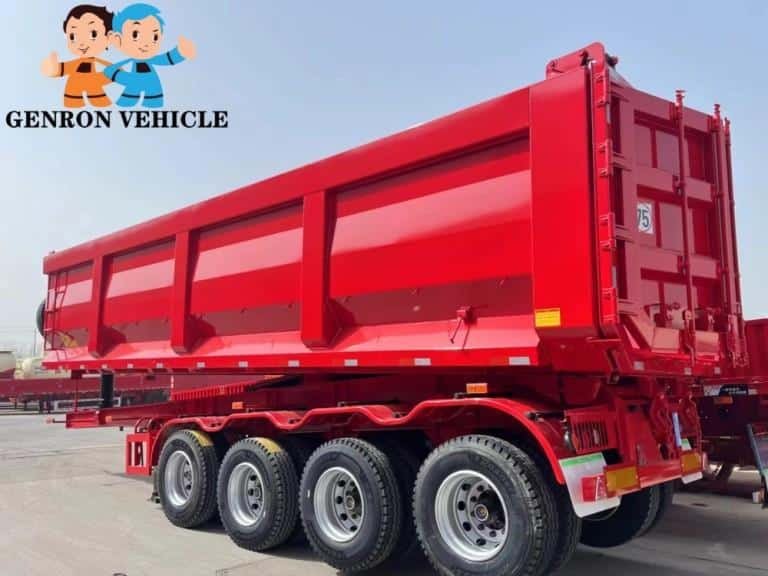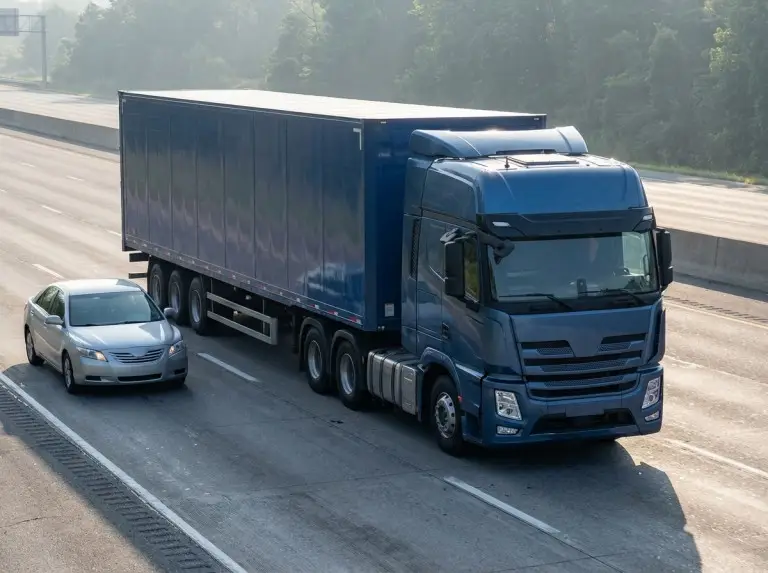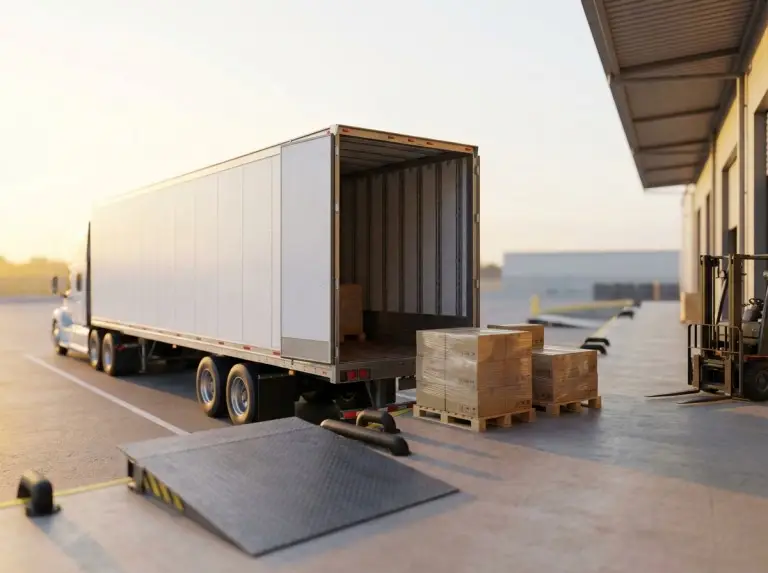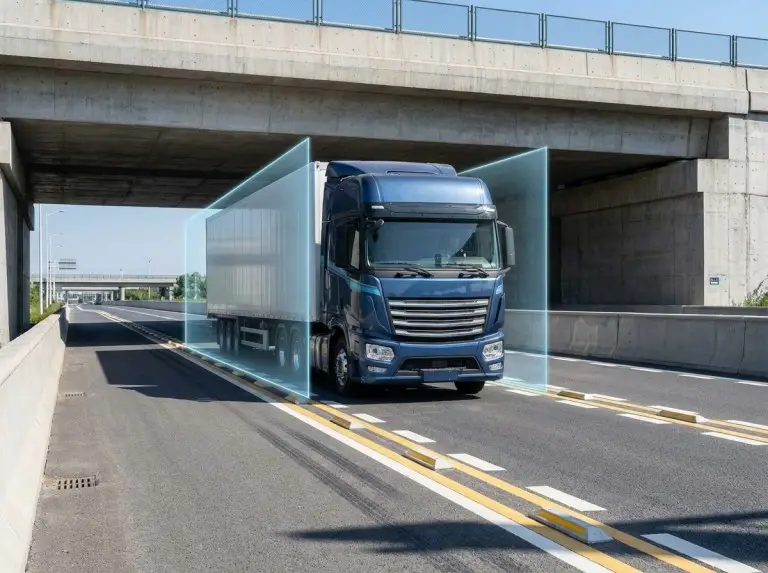Semi-trailers are key in the logistics world, moving goods over long distances. They are very versatile. A semi-trailer is pulled by a tractor unit. It doesn’t have a front axle. Instead, it relies on the tractor for support and power. There are many types, like flatbeds and dry vans, and special ones like tankers and lowbed trailers.
At Genron International Trade, we make top-notch semi-trailers. We offer tanker, lowbed, flatbed, and rear dump models. In addition, you can also customize them. Knowing the different types helps businesses pick the right one for their needs.
Table of Contents
Understanding Semi-Trailers and Their Role in Transportation
Semi-trailers are built strong and have advanced features. They meet the needs of today’s transport. At Genron International Trade, we focus on quality and performance in our semi-trailer designs and manufacturing.
Key Components of a Semi-Trailer
A semi-trailer has important parts for safe and efficient transport. These include:
- A strong steel frame is the trailer’s backbone.
- Axles and wheels that spread the weight evenly for stability.
- A suspension system that absorbs shocks and vibrations, protecting cargo and equipment.
- A braking system that works with the tractor unit for reliable stopping.
Importance in the Logistics Industry
Semi-trailers are vital in the logistics world. They help move goods and materials efficiently. They connect manufacturers with distributors and consumers, making freight flow smoothly over long distances. Our trailers are made with care, focusing on strength, weight distribution, and meeting international standards.
Investing in quality semi-trailers can improve a business’s transport operations. It can also cut costs and boost customer happiness. At Genron International Trade, we aim to provide top transportation solutions through advanced manufacturing and service.
Begin with a bespoke semi-trailer designed for your exact needs. Whether it’s heavy-duty hauling or specialized cargo, we’ve got the perfect solution to keep you moving forward.
Dry Van Trailers: The Most Common Type
The dry van trailer is a key player in the logistics world. It offers a safe and weatherproof way to transport goods. We know how important dry van trailers are for moving goods and we’re dedicated to delivering quality solutions for our customers.
Features and Specifications
Dry van trailers are built to keep goods safe and dry. They are 53 feet long, with a maximum width of 101 inches and a height of 110 inches. They can carry up to 45,000 pounds.
Some key features of dry van trailers include:
- A fully enclosed box-like structure for protection from weather and security for cargo
- Lots of interior space for different types of goods
- Great for carrying palletized, boxed, or loose items
Common Uses and Benefits
Dry van trailers are used for moving sensitive or valuable goods like electronics, furniture, or pharmaceuticals. They are a cost-effective choice for businesses, with a lower cost per mile than specialized trailers.
The benefits of dry van trailers include:
- Efficient transport of large volumes of standard-sized cargo
- Easy to load and unload at standard docks, making logistics smoother
- A cost-effective option for many shipping needs
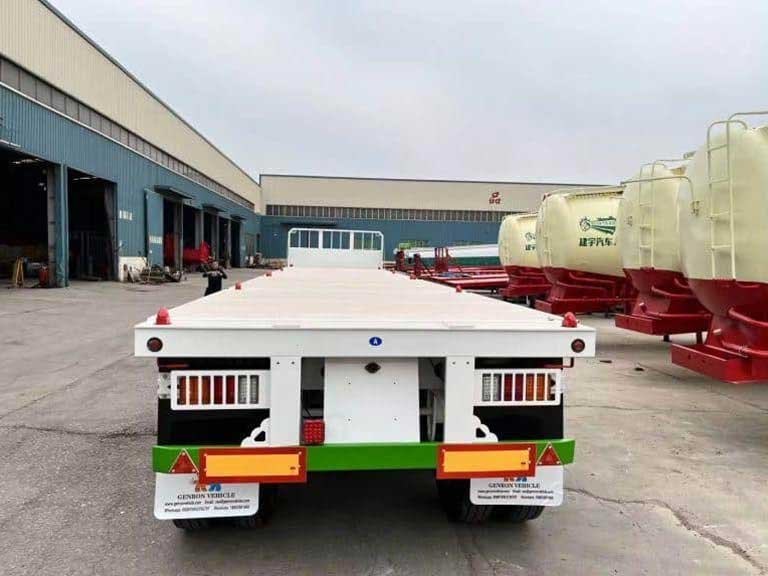
Flatbed Trailers: Versatility for Open-Air Transport
Flatbed trailers are essential in the logistics world, offering unmatched versatility for open-air transport. We create strong flatbed trailers for a wide range of cargo, from construction materials and machinery to vehicles and steel.
Design and Load Capacity
Our flatbed trailers have an open design without walls or a roof. This makes loading and unloading cargo easy from any side or above. They are 48 feet long and can carry up to 48,000 pounds.
Industries and Applications
Flatbed trailers are very versatile and suitable for many industries such as construction and agriculture. They’re perfect for moving big or odd-shaped loads. At Genron International Trade, we offer custom flatbed trailers for our clients.
Refrigerated Trailers: Temperature-Controlled Transport
Reefer trailers are trailers made for keeping things cool during transport. They’re key for businesses with perishable goods like food and medicines.
Temperature Control Systems
Reefer has advanced systems to keep a steady temperature. They use insulated walls and ceilings and strong refrigeration units. This keeps temperatures between -20°F and 70°F.
The cooling system works on its own, using a separate engine or electric motor. This keeps the temperature right, even when the main engine is off.
Transporting Perishable Goods
Reefer is vital for moving sensitive items like fresh produce and frozen foods. They can carry up to 45,000 pounds, just like dry vans. This keeps products safe during transport.
Reefers have a bit smaller inside due to insulation. They’re about 8 feet, 2 inches tall and wide. This lets them carry a wide range of cargo.
Different Types of Semi-Trailers for Specialized Cargo
There’s a need for special trailers for odd or oversized equipment. These trailers are made for cargo that’s hard to move with regular trailers.
Step Deck Trailers
Step deck trailers have a two-level design for tall cargo. The main deck is about 3 feet, 6 inches off the ground. They can carry loads up to 10 feet, 2 inches tall.
Double Drop/Lowboy Trailers
Double drop trailers have two drops in the deck for very tall loads. They can carry items up to 11 feet, 6 inches tall. They’re great for heavy construction equipment.
Extendable Trailers
Extendable trailers can grow from 38 feet to 65 feet. They’re perfect for long items like wind turbine blades. Their flexibility is key for moving oversized cargo.
At Genron International Trade, we make lowbed trailers for heavy equipment and oversized cargo. They’re built for safe and efficient transport.
- Specialized semi-trailers accommodate unique cargo dimensions.
- Drop-deck trailers allow for taller cargo with their two-level design.
- Double drop trailers enable the transport of exceptionally tall equipment.
- Extendable trailers are ideal for long items like wind turbine blades.
Specialized Semi-Trailer Designs
Specialized semi-trailers are key for safe and efficient cargo transport. They’re made for specific needs, combining the best of different trailers. This solves many transport problems.
Curtain Side and Conestoga Trailers
Curtain side trailers have a solid roof and sides that can open for easy loading. They offer protection from the weather like an enclosed trailer but also allow for side loading. Conestoga trailers have a special tarp system that can open completely. This lets you load from the top, sides, or back while keeping everything dry.
Both curtain-side and Conestoga trailers are great for keeping cargo dry during transport. They’re made with strong materials like steel and special composites. This makes them last long and meet all the rules.
| Trailer Type | Key Features | Benefits |
| Curtainside | Solid roof, front, and rear; flexible tarp sides | Weather protection; versatile loading |
| Conestoga | Sliding tarp system on arched bows | Flexible loading options; element protection |

Tanker and Dump Trailers
Fuel tanker trailers are made for moving liquids, gases, and dry materials. End dump trailers have a special system that lets you tilt the bed for easy unloading.
These trailers are built to last with materials like steel and aluminum. They’re used in many industries, like oil, chemicals, and building.
| Trailer Type | Primary Use | Key Feature |
| Tanker | Liquids, gases, dry bulk | Pressure vessel design |
| Dump | Loose materials | Hydraulic tilting system |
Choosing the Right Semi-Trailer for Your Needs
It’s important to know what you need to choose the right semi-trailer. Think about the type of freight, its size, weight, and any special needs it might have. These things help decide which trailer is best for you.
Factors to Consider
There are many things to think about when picking a semi-trailer. The kind of freight you’re moving affects the trailer’s design. The trailer’s weight capacity is also key, as it tells you how much you can carry. Other important things include the axle type, how you load and unload, and how durable and easy to move the trailer is.
- Look at your cargo’s size and weight.
- Think about any special needs, like keeping things cool.
- Check the trailer’s weight limit and axle type.
Matching Trailer Types to Cargo Requirements
There are trailers for different kinds of cargo. Dry van trailers are good for most freight. Refrigerated trailers keep things cool for perishables. Flatbed trailers are great for big or odd-shaped items.
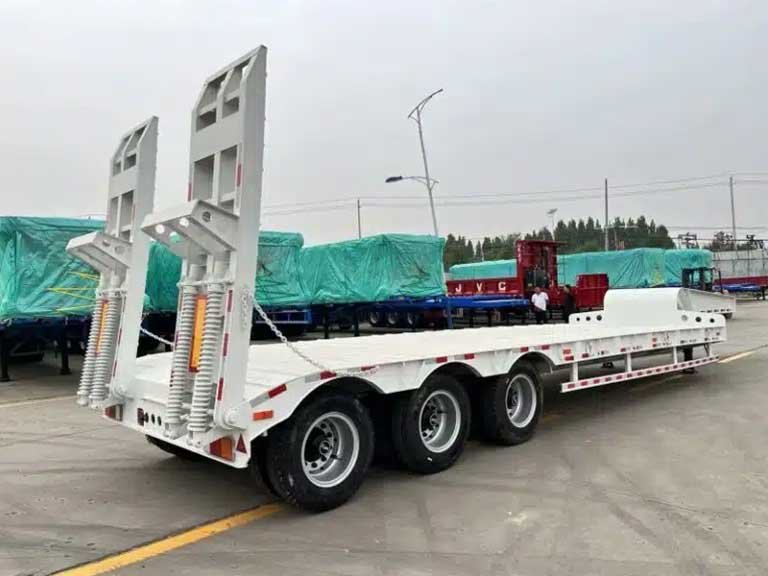
Maintenance and Safety Considerations for Semi-Trailers
Keeping semi-trailers in good shape is key. It ensures safety for everyone on the road. Regular checks and safety steps are a must.
It’s important to keep semi-trailers running well. This means checking tires, brakes, and electrical systems often.
Regular Inspection and Maintenance Tips
Regular checks on your semi-trailers are a must. Look for tire wear and check brakes for damage. Make sure lights and electrical systems work right.
Don’t forget about routine care. This includes oil changes, greasing parts, and replacing worn-out parts.
Safe Loading and Unloading Practices
Securing cargo is very important. Use straps, chains, or other restraints to keep it in place.
Spread the weight evenly for balance. Always follow weight limits to avoid overloading.
| Maintenance Activity | Frequency | Importance |
| Tire Inspection | Pre-Trip, Weekly | High |
| Brake Inspection | Pre-Trip, Monthly | High |
| Electrical System Check | Pre-Trip, Quarterly | Medium |
| Oil and Filter Changes | Regularly Scheduled | High |
Conclusion
The future of semi-trailer tech is exciting. It’s all about being more efficient, safe, and green. At Genron International Trade, we’re leading the way with new tech like telematics and IoT sensors.
We offer a range of top-notch trailers, including tankers and flatbeds. Our designs are made with the latest techniques for quality and durability. We focus on what our customers need, always improving our products.
As logistics get more complex, choosing the right semi-trailer is key. We’re dedicated to providing quality, customized solutions for our customers in Africa, Southeast Asia, and more.
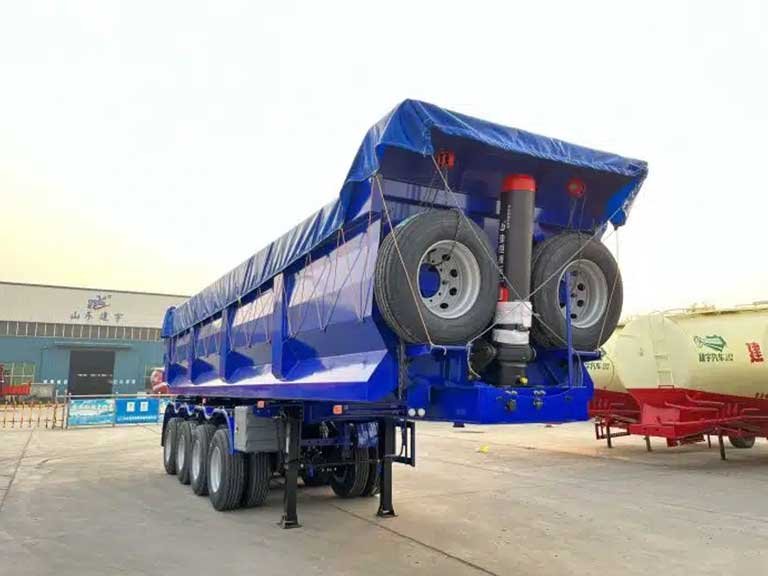
FAQ
What is the maximum weight capacity of a dry van trailer?
The weight capacity of a dry van trailer depends on the manufacturer and model. It usually goes from 45,000 to 53,000 pounds. The payload capacity also depends on the trailer’s material, construction, and axles.
What are the benefits of using a flatbed trailer for cargo transport?
Flatbed trailers are great for moving big or odd-shaped items. They’re perfect for heavy equipment and construction stuff. This is because they don’t have a roof, making it easy to load and unload.
What factors should be considered when choosing a semi-trailer for cargo transport?
Choosing a semi-trailer depends on a few things. You need to think about the size and weight of your cargo. Also, consider if you need special features like refrigeration. Make sure it fits your needs and follows the rules.
Can dry van trailers be customized to meet specific cargo needs?
Yes, dry van trailers can be made to fit your cargo. You can add different doors, load bars, and tie-downs. This makes moving stuff safer and more efficient.
What are the advantages of using curtainside trailers for cargo transport?
Curtain-side trailers are flexible and efficient. They let you access your cargo from the sides. This makes loading and unloading faster. They’re good for many types of cargo, including pallets.
How do tanker trailers differ from other types of semi-trailers?
Tanker trailers are made for liquids or gases. They have a tank that’s safe for these cargo types. They’re used in industries like oil, chemicals, and food for moving big amounts of liquid.

